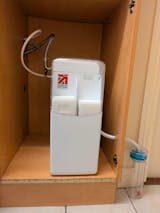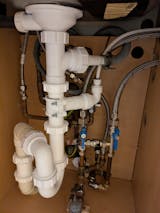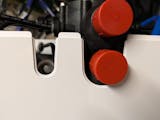Installing a Water Softener with Combi Boiler - Everything You Need to Know
Installing a water softener with a combi boiler can often raise a series of questions. To make things easier, we have listed common questions below to provide everything you need to know about installing a water softener and combi boiler together.
1. Softener Compatibility
Are water softeners compatible with all types of combi boilers/ Will a water softener work with a combi boiler?
Yes! Water softeners are compatible with combi boilers and other types of boiler systems! Not only will an ion exchange water softener work with a combi boiler, but it can also protect the boiler and reduce any limescale present.
What factors should be considered when choosing a water softener for a combi boiler?
We suggest making sure the water softener has a good pressure range (8 or 10 Bar) so that it can handle pressure variations. For example, the Harvey TwinTec S4 has Smart Shuttle Metering designed specifically for pressure adaptations and all different types of boilers with pressure systems, including gravity-fed systems, tanks in the loft, combination boilers, and high-flow cylinders2. Functionality
How does a water softener work with a combi boiler system?
Calcium and magnesium ions from hard water create limescale. When passing through a boiler system, this scale can build up over time. The first sign is a heating system that doesn’t seem as efficient; a coating of limescale on the heat exchanger requires more energy and time to heat. If left untreated, eventually this limescale buildup can cause irreversible damage to the pipework and boiler itself – causing breakdowns and a shorter lifespan.
What is the impact of hard water on combi boilers?
Hard water can negatively impact combi boilers and decrease their lifespan. Hard water contains excess calcium and magnesium ions, which create limescale. When passing through a boiler system, this scale can build up over time. The first sign is a heating system that doesn’t seem as efficient; a coating of limescale on the heat exchanger requires more energy and time to heat. If left untreated, eventually this limescale buildup can cause irreversible damage to the pipework and boiler itself – causing breakdowns and a shorter lifespan.
3. Installation of a water softener with a combi boiler
What is the recommended method for installing a water softener with a combi boiler?
You can install a water softener with a combi boiler in the regular way! You first have to install the system near the stop tap and intersect the incoming mains supply of water. The process then involves adding bypass valves and other pipework to connect the water softener. It is recommended that this process is carried out by a plumber.
Are there any specific requirements or considerations for the placement of the water softener?
Yes, there are several requirements and considerations for the placement of a water softener, particularly when integrating it with a combi boiler system. You should consider:
- Distance to the stop tap and main water supply: The water softener should be installed close to the main stop tap and incoming water supply line.
- Space and Size: Before purchasing, you need to ensure there is enough space to install a water softener.
- Drainage Access: When a water softener regenerates, it produces waste. Therefore, a water softener needs to be connected to a drain supply.
- Temperature Considerations: A water softener needs to be installed in an area that is not exposed to high or very low temperatures.
- Water Pressure and Pressure Requirements: This is very important for flow rate and the water pressure entering the home through your outlets.
- Bypass Valve: When a plumber installs your system, they will often restructure pipework and include a bypass.
4. Maintenance
What maintenance is required for a water softener used with a combi boiler?
It is important to carry out maintenance on your water softener to ensure it works well, maintains good efficiency, and has a long lifespan. We recommend the following water softener maintenance tasks:
Every few months:
- Check Salt Levels
- Clean the Brine Tank
- Inspect the System for Salt Bridges
- Regenerate the Resin Bed
- Inspect and Clean the Injector
- Monitor Water Hardness Levels
Annually:
- Check and Clean the Resin Tank
- Inspect Valves and Bypass
- Sanitise the System
How often should the water softener be serviced?
Electric water softeners require servicing every 2 years by law. However, a non-electric system (which we recommend) does not have this requirement. We advise following the above maintenance tips and considering a professional service every 2-3 years.
5. Performance
How does a water softener improve the efficiency and lifespan of a combi boiler?
A water softener can significantly improve the efficiency and lifespan of a combi boiler by removing limescale and addressing other issues caused by hard water. This includes: preventing limescale buildup, enhancing boiler efficiency, extending the boiler lifespan, lowering maintenance costs, and improving performance.
6. Descaling and Limescale
How does a water softener prevent limescale build up in a boiler?
A water softener prevents limescale buildup in a boiler by removing the hard ion minerals that cause scale formation. It uses ion exchange to remove hard magnesium and calcium ions, replacing them with soft sodium ions.
What are the benefits of using a water softener over other descaling methods?
Using a water softener has several advantages over other descaling methods, especially for long-term prevention of limescale buildup and overall efficiency. Key benefits of using a water softener include:
- Continuous Protection and Prevention vs. Removal: Unlike other descaling methods that remove existing scale, a water softener prevents the formation of limescale in the first place, offering a proactive solution.
- Improved Heating Efficiency
- Extended Appliance Lifespan
- Reduced Maintenance Costs
- Lower Energy Bills
- Automatic Operation
- Low Maintenance
- Whole-House Solution
- Improved Soap and Detergent Performance
- Skin and Hair Benefits
- Spot-Free Cleaning
7. Cost and Efficiency
What are the cost implications of installing a water softener with a combi boiler?
You should consider cost implications in terms of outgoings versus cost savings. These include:
- Water Softener Purchase Price
- Installation Cost
- Ongoing Costs of Salt
Cost Savings of a Water Softener:
- Return on Investment: The initial investment in a water softener and its installation can be significant, but the long-term savings on energy, appliance maintenance, and replacement costs can provide a great return on investment.
- Property Value: Installing a water softener can be seen as an investment to maintain your property and an upgrade that may increase the resale value of your home, particularly in areas with hard water.
- Energy Efficiency & Reduced Energy Bills
- Extended Appliance Lifespan & Maintenance Savings
- Detergent Savings
- Shampoo & Shower Gel Savings
- Less Wear and Tear
- Less Cleaning & Cleaning Products
8. Water Quality
What impact does a water softener have on water quality for household use?
A water softener can change the quality of your water in a positive way. Soft water has several benefits:
- Reduced Hardness, Elimination of Hard Minerals
- Enhanced Soap & Detergent Efficiency
- Softer Skin and Hair
- Household Appliance Longevity
- Protection Against Scale
- Cleaning Efficiency, Spot-Free Dishes and Glassware, Reduced Soap Scum
- Improved Laundry Results, Brighter and Softer Fabric, Longer Fabric Life




